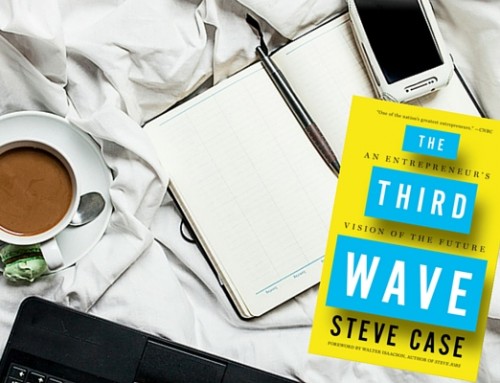A long time ago I was a revolutionary at Apple. My job title was “software evangelist.” My responsibility was to evangelize Macintosh to software developers. Later my title was “chief evangelist,” and my responsibility was to evangelize Macintosh to anyone who wanted to increase productivity and creativity.
Post Apple, I’ve been many things: author, speaker, entrepreneur, venture capitalist, advisor, and father, but I’ve never used the title “chief evangelist” until today. This is because the title only works if your product can change the world—or at least a significant part of it.
Macintosh changed the world. It democratized computers. Google changed the world. It democratized information. eBay changed the world. It democratized commerce. After two decades of looking, I found Canva. It can change the world by democratizing design, and that’s why I’m now chief evangelist of Canva.
We’re big believers in “content marketing” at Canva. It means providing information that’s valuable to our readers and customers. We define “valuable” as something that you can make your life better as opposed to increasing our sales or profits. In this spirit, I’d like to explain how to evangelize a product or service.
- Make it great. It’s very hard to evangelize crap. It’s much easier to evangelize great stuff. I learned that the starting point of evangelism is a great product or service. Great stuff embodies five qualities:
- Deep. This means your product or service has lots of features because you’ve anticipated what people need as they come up the power curve.
- Intelligent. When people use your product or service, they see that someone smart understood their problem or pain.
- Complete. A complete product is surrounded with everything you need. For example, great software is not just the downloadable file. It’s also the documentation, support, and string of enhancements.
- Empowering. A product or service empowers people because it makes them better. Great stuff doesn’t fight you—it becomes one with you.
- Elegant. This means that your product or service is not just functional, it’s also well-designed so that people could use it easily and quickly.
- Position it as a “cause.” A product or service, no matter how great, is a collection of parts or snippets of code. A “cause,” by contrast, changes lives. It’s not enough to make a great product or service—you also need to position it and explain it as a way to improve lives. Steve Jobs didn’t position an iPhone as $188 worth of parts. Evangelists need to seize the moral high ground and transcend the exchange of money for goods and services.
- Love the cause. “Evangelist” isn’t a job title. It’s a way of life. It means that evangelists must love what they evangelize. No matter how great the person, if he doesn’t love the cause, he cannot be a good evangelist for it. If you don’t love it, don’t evangelize it. This has hiring implications too: a good education and relevant work experience are not sufficient. It’s just as important that an evangelist loves the product or service.
- Localize the pitch. Don’t describe your product using lofty, flowery terms like “revolutionary,” “paradigm shifting,” and “curve jumping.” Macintosh wasn’t “the third paradigm in personal computing.” It simply (and powerfully) increased the productivity and creativity of one person with one computer. People don’t buy “revolutions.” They buy “aspirins” to fix the pain or “vitamins” to supplement their lives, so localize the pitch and keep it simple.
- Look for agnostics, ignore atheists. It is very hard to convert someone to a new religion when he worships another god. The hardest person to convert to Macintosh was someone who worshipped MS-DOS. The easiest person was someone who never used a personal computer before. If a person doesn’t “get” your product or service after fifteen minutes, cut your losses and move on.
- Let people test drive the cause. Evangelists believe that their potential customers are smart. Therefore, they don’t bludgeon them with ads and promotions. Instead they provide ways for people to “test drive” their products and then decide for themselves. Evangelists believe that their products are good—so good that they’re not afraid of enabling people to try before they buy.
- Learn to give a demo. “Evangelist who cannot give a great demo” is an oxymoron. If you can’t give a great demo of your product or service, you cannot be an evangelist for it. Demoing should be as second nature, even involuntary, as breathing. This is what made Steve Jobs the world’s greatest evangelist for Apple’s products.
- Provide a safe, easy first step. The path to adopting a cause should have a slippery slope, so remove all the barriers. Examples: 1) revamping an entire IT infrastructure shouldn’t be necessary to try a new computer; chaining yourself to a tree shouldn’t be necessary to join an environmental group; and 3) speaking a foreign language and owning a special keyboard shouldn’t be necessary to register for a website.
- Ignore titles and pedigrees. Elitism is the enemy of evangelism. If you want to succeed as an evangelist, ignore people’s titles and pedigrees, accept people as they are, and treat everyone with respect and kindness. My experience is that a secretary, administrative aide, intern, part-timer, or trainee is more likely to embrace new products and services than a CXO or vice-president.
- Never lie. Lying is morally and ethically wrong. It also takes more energy because when you lie, it’s necessary to keep track of what you said. If you always tell the truth, then there’s nothing to keep track of. Evangelists evangelize great stuff, so they don’t have to lie about features and benefits, and evangelists know their stuff, so they never have to lie to cover their ignorance.
- Remember your friends. Be nice to people on the way up because you’ll see them again on the way down. One of the most likely people to buy a Macintosh was an Apple II owner. One of the most likely people to buy an iPod was a Macintosh owner. One of the most likely people to buy whatever Apple puts out next is an iPhone owner. And so it goes, so remember your friends.
People often ask me what the difference is between evangelist and salesperson. Here’s the answer. A salesperson has his or her own best interests at heart: commission, making quota, closing the deal. An evangelist has the other person’s best interests at heart: “Try this because it will help you.” Keep this difference in mind, and you’ll be on the right track.
Try Canva to see why I left my comfy existence and joined a startup to democratize design. You can see how Canva works with a click.
Guy Kawasaki is the chief evangelist of Canva, an online graphic design tool. Formerly, he was an advisor to the Motorola business unit of Google and chief evangelist of Apple. He is also the author of APE, What the Plus!, Enchantment, and nine other books. Kawasaki has a BA from Stanford University and an MBA from UCLA as well as an honorary doctorate from Babson College.



very good
Guy,
I absolutely love the idea of evangelizing our products and services as causes, not just things. I recently attended a blogging conference and was really touched by a keynote speech entitled “Start With Why” and the message was that people care about other people who value the same things they do. When you start with a cause you both value, you’re much more likely to form a mutually beneficial relationship.
In other news, I’m signed up for a business event here in Salt Lake City and the calendar says you’ll be there– I sure hope that’s not imaginary because I would LOVE to meet you! Do you have plans to be in Salt Lake any time in the near future? That would be awesome. =)
Hope to see you soon!
Brittany
The basis for all evangelism is truth, which I understand, you do know something about. Thanks Guy. Keep it up.
Loved the article Guy, as we are struggling with the customer story for a new product.
You did such a good job of applying it to the Canva concept that you got me intrigued, but when I clicked on the link I got an “Oops” page?
Kind regards
Thanks for this article Guy! I am exploring my own potential to be an evangelist with a certain company and this really helped me in my reflections about crafting the position.j
Hello guy, this is really good stuff, I recently started thinking and teaching about evangelism marketing in my town in Nigeria, thinking I had invented a new concept and then I checked Google.
Its nice to hear you teach the concept with a much deeper wealth of experience.
Funny I would run across this today. I’ve had people refer to me as the “Carvangelist” because that’s all I ever talk about. .